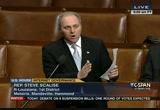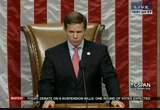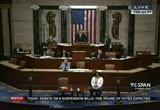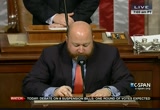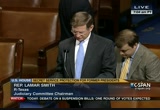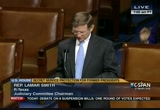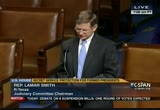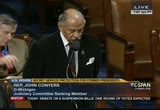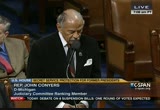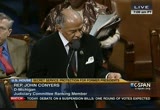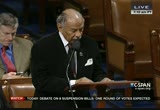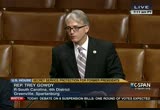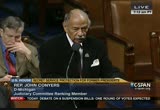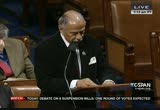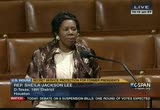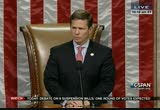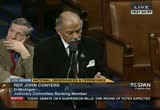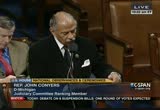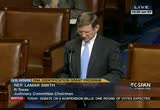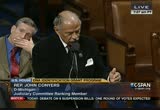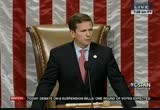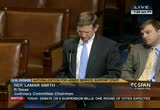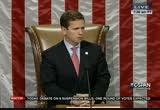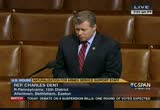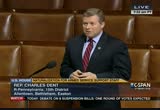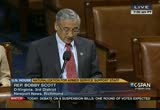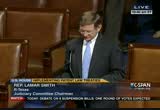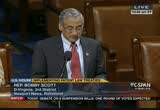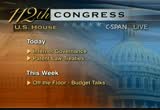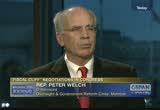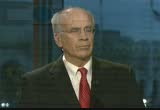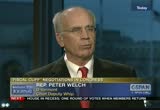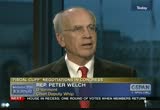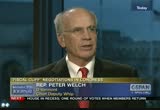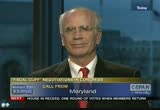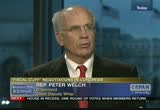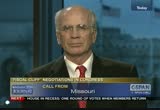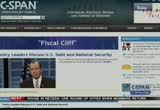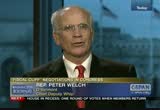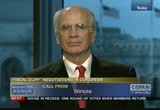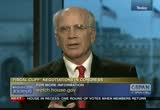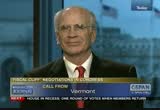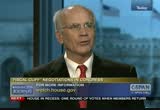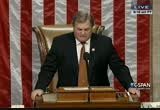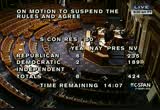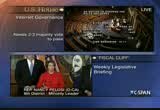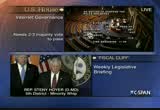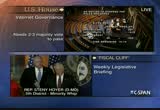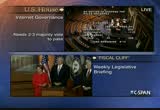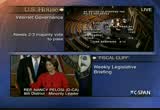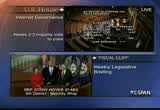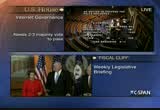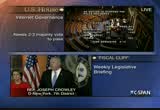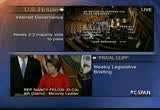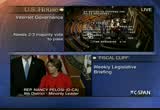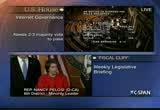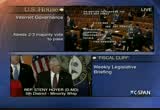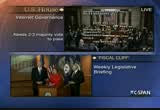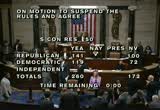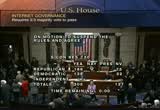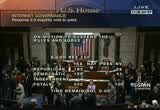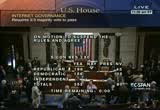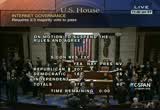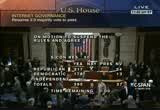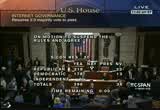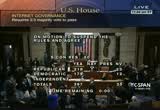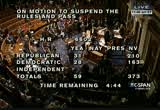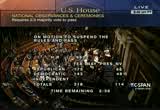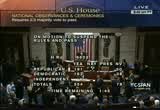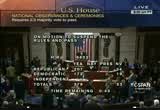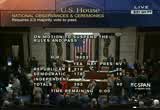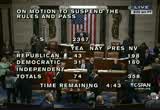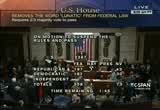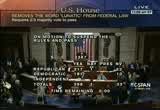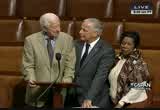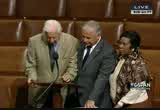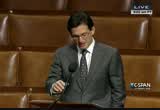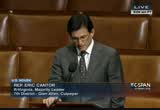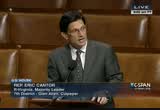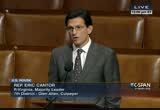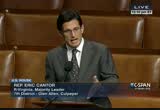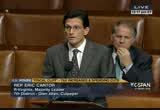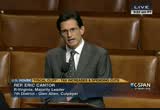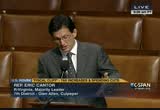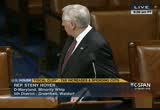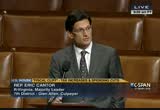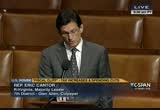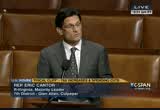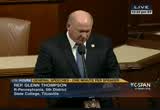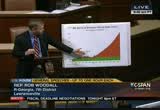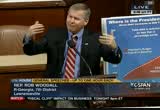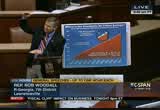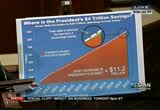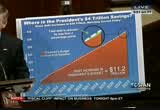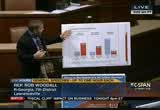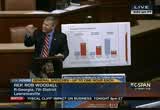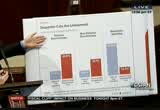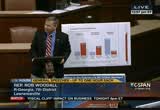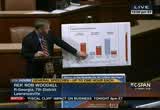tv Public Affairs CSPAN December 5, 2012 10:00am-1:00pm EST
10:00 am
for internet freedom, to say it's the united states' congress' bipartisan agreement that we want to maintain that freedom. we don't want the united nations control oferte internet. i yield back the balance of my time. the speaker pro tempore: the gentleman yields back. the gentlelady fromtown tfpblet mrs. blackburn: thank you, mr. speaker. we have no further speakers, and as i close i want to thank ms. eshoo for the leadership that she has given. she's the ranking member of the telecommunications and internet subcommittee. i also want to draw attention to the outstanding work that representative mary bono mack did as she led the debate and the discussion and pushed for the resolution authored the resolution that the house passed earlier on this very issue. i also want to thank her for her work with senator rubio and having a resolution that would be agreed to by both chambers. as ms. eshoo indicated errier, the senate resolution makes a
10:01 am
technical change, a small technical change in the resolution that was passed by the house. . this is where the u.s. needs to stand firm. it's how we can stand firm for freedom. i encourage the passage of this resolution, and i encourage that we as a body will continue to stand for a free and open internet. and with that i yield back the balance of my time. the speaker pro tempore: the gentlelady yields back the balance of her time. the question is will the house suspend the rules and agree to senate concurrent resolution 50. as many as are in favor will signify by saying aye. those opposed, no. in the opinion of the chair -- black plaque mr. speaker, i ask for a recorded vote. the speaker pro tempore: 2/3 having responded in the affirmative, the rules are suspended, the concurrent resolution is agreed to -- mrs. blackburn: i ask for the yeas and nays. the speaker pro tempore: the yeas and nays are requested. all those in favor of taking this vote by the yeas and nays
10:02 am
10:03 am
for what purpose does the gentleman from texas seek recognition? mr. smith: mr. speaker, i move that the house suspend the rules and pass h.r. 6620, the former presidents protection act of 2012. the speaker pro tempore: the clerk will report the title of the bill. the clerk: h.r. 6620, a bill to amend title 18, united states code, to eliminate certain limitations on the length of secret service protection for former presidents and for the children of forming presidents. the speaker pro tempore: pursuant to the rule, the gentleman from texas, mr. smith, and the gentleman from michigan, mr. conyers, each will control 20 minutes. the chair recognizes the gentleman from texas. mr. smith: mr. speaker, i ask unanimous consent that all members may have five legislative days to revise and extend their remarks and include extraneous material on h.r. 6620 currently under consideration. the speaker pro tempore: without objection, so ordered. mr. smith: and mr. speaker, i yield myself such time as i may consume. the speaker pro tempore: the
10:04 am
gentleman is recognized. mr. smith: mr. speaker, h.r. 6620, the former presidents protection act of 2012, amends federal law to uniformerly provide lifetime secret service protection to all of america's former presidents. i want to thank the gentleman from south carolina, mr. gowdy, and the gentleman from virginia, mr. scott, for sponsoring this commonsense bipartisan legislation. america has a responsibility to protect its presidents and its families and not simply while they serve in office. we also have a duty to ensure the ongoing safety of those who serve in america's highest elected office after they leave office. in 1958 congress first authorized secret service protection for former presidents, which was limited to a reasonable period of time after a president leaves office. congress expanded this to lifetime protection in 1965. but in 1994, congress once again limited secret service protection for former presidents.
10:05 am
this time to 10 years after a president leaves office. this 10-year restriction applied to presidents who took office after january 1, 1997. the role of the former president has changed throughout the years. former presidents now have a global presence and are often seen as de facto representatives of the united states. whether it's former president carter's work in peace negotiations with other countries or president clinton's global initiative, former presidents have a valuable role in using their experience and knowledge to help the u.s. in both a public and private capacity. the world has changed dramatically since the 9/11 terrorist attacks. the threats to american personnel and interests continue as terrorists raged a war against the united states. arbitrarily limiting the secret service protection to 10 years might have been good after the cold war ended and before the global war on terror begun. in which they're considered
10:06 am
targets, we must make sure that the security of our former chief executives are not jeopardized. h.r. 6620 recognizes that those who serve as president are symbols of america and american freedoms and deserve to be protected. there are only a handful of americans who will be called upon to serve this country as president. these individuals represent america not only while serving in office but remain in the public consciousness long after they leave. h.r. 6620 simply recognizes this unique role and reinstates lifetime protection for all of our former presidents. i want to again thank mr. gowdy and mr. scott for their work on this issue, and i urge my colleagues to support the bill. i'll reserve the balance of my time. the speaker pro tempore: the gentleman reserves. the gentleman from michigan. mr. conyers: mr. speaker, i yield myself such time as i may consume. the speaker pro tempore: the gentleman from michigan is recognized. mr. conyers: ladies and gentlemen, h.r. 6620 is a
10:07 am
commonsense bill that will ensure the continued safety of the white house by extending e the ability of the secret service to protect former presidents, and i'm proud to join with the chairman, mr. smith of judiciary, in support of this bill. for presidents who didn't serve prior to 1997, current federal law provides that the secret service's protection terminates 10 years after the president leaves office. the 10-year limitation was enacted in 1994 when the nature of threats to former presidents was more limited. but times have changed, and it's an unfortunate fact that former presidents will require secret service protection for the rest of their lives. therefore, this bill will
10:08 am
simply restore the law to its prior form. when a president of the united states completes his term, they remain a symbol of our nation. sadly, our presidents who worked hard to protect us from those who would harm our nation may themselves continue to be in harm's way even after they complete their terms in office. most former presidents remain prominently in the public eye, continuing to represent our country in significant ways and providing leadership on important issues. we should recognize and encourage their continued service by providing them with the protection they need. this bill would also expand the secret service's authorization to protect the children of former presidents until they reach 16 years of age.
10:09 am
this also makes good sense under the current circumstances. i want to recognize the secret service for their excellent and tireless job that they perform in protecting our national leaders. the men and women of the secret service conduct themselves with valor and while carrying out the protective function of their agency. they provide protection for a variety of people and events, including the president and national security -- special national security events as well. the secret service has other important functions which also deserve recognition. for example, the investigative role of the secret service has expanded greatly from protecting the currency against
10:10 am
counterfeiting to investigating a wide variety of crimes related to this country's financial institutions and credit systems. i, too, join in commending the gentleman from south carolina, a member of our committee, trey gowdy, for his special work on this bill. and i urge my colleagues to support h.r. 6620 and, mr. speaker, i yield back -- i reserve the balance of my time. the speaker pro tempore: the gentleman reserves. the gentleman from texas. mr. smith: mr. speaker, i yield as much time as he may consume to the gentleman from south carolina, mr. gowdy, who is the sponsor of this legislation. the speaker pro tempore: the gentleman from south carolina is recognized. mr. gowdy: thank you, mr. speaker. mr. speaker, i would like to first thank mr. chairman, lamar smith. this may be my last opportunity to thank him for his service as chairman of the judiciary committee. not just this bill but for the full two years he's done a
10:11 am
fantastic job. and i would like to thank the chairman for that. mr. speaker, two things are clear. protection, security, public safety, those are the fundamental obligations of government. and secondly, we live in an increasingly dangerous world with increasing threats against our citizens and targets that are viewed as high profile. for those reasons, mr. speaker and others, i earnestly believe those who serve this country as president should never have to worry about their personal safety. under current law, protection for president obama and president george w. bush will cease after 10 years. both men are young, enjoy good health and have long lives ahead of them postpresidency. this bill proposes to extend that security for the remainder of their lives. there's an unintended anomaly, mr. speaker, that were current law not changed, barbara bush
10:12 am
would have more safety than if they were president themselves. the person and the symbol of our presidency is safe and secure for the occuration of their natural lives. with that i would yield. the speaker pro tempore: the gentleman yields back. the gentleman from michigan. mr. conyers: mr. speaker, before i yield to the distinguished gentlelady from texas, i'd like to observe the great relationship that has been formed on judiciary between myself and the distinguished gentleman from san antonio, texas. for four years, he was the ranking member on his side while i was chair. we worked together. and for two years as chair, i worked as his ranking member.
10:13 am
and we had a cordial and i think important relationship in framing and putting forward the issues for the committee on the judiciary. of course. with pleasure. mr. smith: mr. speaker, i wanted to thank the chairman of the judiciary committee himself for those comments and say i enjoyed our working relationship over the last six years and note that will continue as well. mr. conyers: thank you very much. i now turn to the gentlelady from texas, a senior member of judiciary, ms. sheila jackson lee. i will yield her as much time as she may consume. the speaker pro tempore: the gentlelady from texas is recognized for as much time as she may consume. ms. jackson lee: i thank the gentleman verp. this is an enormously positive exhibition of the working relationship of the members of the house judiciary committee. and i thank both the chairman and ranking member for the
10:14 am
evidence of collegiality of the waning moments of the 112th congress. i want to follow my ranking member and acknowledge appreciation for the service of judiciary committee chairperson lamar smith who happens to be a tall texan and so we are delighted to thank him very much for the work that he's done. and to join with and established icon of judiciary prominence in john conyers, the two matched well in their excellence. and i thank the ranking member and the former chairperson for his work and service. there's great work being done by the judiciary committee, and i think it is enormously important that we are the holders and protectors of the constitution on behalf of not only our members but on behalf of the united states of america. it is not at this time, but i do want to acknowledge and hope this house will consent at the
10:15 am
appropriate time to acknowledge one of our fallen of great prominence of this committee, someone who i sat in his office as a baby member of congress, the honorable jack brooks, who has passed. and i hope there will be an appropriate moment for us to honor him before we leave today. . i rise to be able to thank the sponsor of this legislation, attract my interest in it to correct something that probably was thought to be a good direction but was not and the limitation of coverage of the president and the president's children, the first family's children. as a member of the homeland security committee, let me say that we are celebratory of the fact that we have not had another attack on our soil since 9/11. if we look at it in a global perspective that we have not fought a war on our soil since, i believe, at least an intense
10:16 am
one, since the civil war. but certainly we know that terrorism and danger has taken a new direction in this country and the world. for those of us who spend time on ensure that the security of the men and/or women who have served as president of the united states and their children can be fully protected. let me acknowledge as well the service of the men and women of the united states secret service
10:17 am
and be very frank, having jurisdiction over the secret service and homeland security and having interacted with them on a number of occasions, and certainly we know that there was a moment in this last year that did not reflect upon the tens upon tens of years, decades of service of the united states secret service. they have done their job well. they have been dutiful servants and protectors of the men that have held the highest office, along with the first ladies and their children. and this legislation speaks to a modern day world where you never know where danger may approach someone who can be utilized in an untoward manner, held hostage, and used to threaten the sanctity and democracy and freedom of this nation. so this plagues reflects our smartness and astuteness in correcting what was probably thought to be good but upon reflection does not reflect on the goodness of this congress, the goodness of the american people who respect the service of their public servants, who have taken to the highest office of this land. with that, mr. speaker, i want to ask my colleagues to support the underlying legislation. as this exhibits our opportunity
10:18 am
that we can work together, i know that we will find the right solution for solving our issues of middlele class tax cuts and the fiscal deadline and make sure we move in a very positive direction. with that i yield back my time. the speaker pro tempore: the gentlelady yields back. the gentleman from texas. the gentleman reserves. the gentleman from michigan. mr. conyers: mr. speaker, we have no further speakers. i am prepared to return the balance of our time. the speaker pro tempore: the gentleman. mr. smith: we have no further speakers on this side. i yield back the balance of my time. the speaker pro tempore: the gentleman yields back. the question is, will the house suspend the rules and pass bill h.r. 6620. so many as are in favor say aye. those opposed, no. in the opinion of the chair, 2/3 of those voting having responded in the affirmative, the rules are suspended, the bill is passed, and without objection the motion to reconsider is laid upon the table.
10:19 am
for what purpose does the gentleman from texas seek recognition? mr. smith: mr. speaker, morph that the house suspend the rules and pass h.r. 6602, to make revisions in title 36, united states code, as necessary to keep the title current and make technical creblingses -- corrections and improvements. the speaker pro tempore: the clerk will report the title of the bill. the clerk: h.r. 6602, a bill to make revisions in title 36, united states code, as necessary to keep the title current and make technical corrections and improvements. the speaker pro tempore: pursuant to the rule, the gentleman from texas, mr. smith, and the gentleman from michigan, mr. conyers, each will control 20 minutes. the chair recognizes the gentleman from texas. mr. smith: mr. speaker, i ask unanimous consent that all members may have five legislative days to revise and extend their remarks and include extraneous material on h.r. 6602, currently under consideration. the speaker pro tempore: without objection, so ordered. mr. smith: mr. speaker, i yield myself such time as i may consume. the speaker pro tempore: the gentleman from texas is recognized. mr. smith: the rules of the house entrusted the judiciary
10:20 am
committee the responsibilities and revision and codification of the statutes of the united states. this power does not give our committee substantive legislative jurisdiction over all areas of law, it merely confers the authority to organize, duly enacted laws into an efficient codification system. the nonpartisan office of law revision counsel is responsible for property codifying public laws and titles and sections of the united states code. from time to time, that office provides the judiciary committee advice as to how to enact a more user friendly and cohesive statutory system. this staff worked cooperatively with the office of law revision counsel to develop h.r. 6602. the bill makes technical changes to title 36 of the united states code. the laws that govern patriotic and national observances. codification laws do not make any substantive changes to existing law. industries, government agencies, and interested parties commented on the draft of h.r. 6602 before its consideration today.
10:21 am
i'm confident this bill will improve our legislative codification system and i encourage my colleagues to support the bill. i reserve the balance of my time. the speaker pro tempore: the gentleman reserves. the gentleman from michigan. mr. conyers: mr. speaker, i yield myself such time as i may consume. the speaker pro tempore: the gentleman from michigan is recognized. mr. conyers: thank you. h.r. 6602 makes revisions in title 36 united states code that are necessary to keep the title current as well as to make technical directions and improvements. h.r. 6602 was prepared by the office of the law revision counsel as part of its ongoing responsibility under 2 u.s.c. section 285-b to prepare and submit to the committee on the judiciary committee -- judiciary one title at a time a complete compilation restatement and revision of the general and permanent laws of the united
10:22 am
states. this legislation gathers provisions relating to patriotic and national observances and ceremonies. patriotic and national organizations, and treaty obligations organizations under the current title 36. the amendments strike the existing abbreviated table of contents of the tight -- entitlement serving a more competitive title table of contents, update the format of the chapter headings and reserve chapters, and make other necessary technical corrections. h.r. 660 is not intended to make any substantive changes to the law. as is typical of the codification process, a number of nonsubstantive revisions are made, including the organization of sections into a more coherent
10:23 am
overall structure. but these changes are not intended to have any substantive effect. i'm pleased again to have worked with chairman lamar smith to draft this legislation and i thank him for moving it to the house floor and urge my colleagues to support this measure. mr. speaker, i reserve the balance of my time. the speaker pro tempore: the gentleman reserves. the gentleman from texas. mr. smith: mr. speaker, i have no further speakers on this side. i don't believe the gentleman from michigan does, either. i yield back the balance of my time. the speaker pro tempore: the gentleman yields back. the gentleman from michigan. mr. conyers: i have no further speakers. i will yield back the balance of my time. the speaker pro tempore: the gentleman yields back. the question is will the house suspend the rules and pass bill h.r. 6602. so many as are in favor say aye. those opposed, no. in the opinion of the chair, 2/3 of those voting having responded in the affirmative, the rules are suspended, the bill is passed, and without objection -- mr. conyers: mr. speaker, i ask for the yeas and nays.
10:24 am
the speaker pro tempore: the yeas and nays are requested. all those in favor of taking this vote by the yeas and nays will rise and remain standing. a sufficient number having arisen, the yeas and nays are ordered. pursuant to clause 8 of rule 20, further proceedings on this question will be postponed. for what purpose does the gentleman from texas seek recognition? mr. smith: mr. speaker, morph the house suspend the rules and pass h.r. 6605, to eliminate an unnecessary reporting requirement for an unfunded d.n.a. identification grant program. the speaker pro tempore: the clerk will report the title of the bill. the clerk: h.r. 6605, a bill to eliminate an unnecessary reporting requirement for an unfunded d.n.a. identification grant program. the speaker pro tempore: pursuant to the rule, the gentleman from texas, mr. smith, and the gentleman from michigan, mr. conyers, each will control 20 minutes. the chair recognizes the gentleman from texas. mr. smith: mr. speaker, i ask unanimous consent that all
10:25 am
members may have five legislative days to revise and extend their remarks and include extraneous material on h.r. 6605, currently under consideration. the speaker pro tempore: without objection, so ordered. mr. smith: mr. speaker, i yield myself such time as i may consume. the speaker pro tempore: the gentleman from texas is recognized. mr. smith: i join the ranking member, mr. conyers, in this bipartisan bill which eliminates and unnecessary reporting requirement on the states from an unfunded federal grant program. earlier this year i co-sponsored with mr. conyers h.r. 6189, the reporting efficiency improvement act. in response to a specific request from the administration, h.r. 189 eliminated two reports that the department of justice was required to prepare for grant programs that have not been funded by congress for many years. one of these grant programs is the d.n.a. identification act of 1994. on october 5 the president signed into law h.r. 6189. h.r. 6605, the bill before the
10:26 am
house today, does for the states what h.r. 6189 did for the federal government. it eliminates the statutory requirement for states to report to the attorney general about grants from the d.n.a. identification act of 1994. because congress has not funded this grant program in nearly a decade, this statutory reporting requirement is unnecessary. i thank mr. conyers and members of the judiciary committee for his initiative on this issue. i urge my colleagues to support this bill and i reserve the balance of my time. the speaker pro tempore: the gentleman reserves. the gentleman from michigan. mr. conyers: i yield myself such time as i may consume. the speaker pro tempore: the gentleman is recognized. mr. conyers: to our colleagues, this measure before us now, 6605, is a noncontroversial bill that makes a single technical correction to the u.s. code. under the government performance and results modernization act of
10:27 am
2010, the department of justice conducts an annual review of statutory reporting requirements that are outdated, duplicative, or otherwise no longer useful to congress. after conducting that review, the department recommended we eliminate two reports, both related to programs that have not received funding from congress for the better part of a decade. last september, with the support of chairman lamar smith, congress passed h.r. 6189. the reporting efficiency improvement act, to remove these two reporting requirements from the federal code. president obama signed h.r. 6189 into law on october 5 of this year. the bill before us today makes a single technical correction to the federal code in order to
10:28 am
reflect the changes we made earlier this year. specifically the legislation eliminates a cross-reference to a report that after the enacted -- enactment of h.r. 6189 no longer exists. this bill is a housekeeping pressure and nothing more. i urge my colleagues to support the legislation and i reserve the balance of my time. the speaker pro tempore: the gentleman reserves. the gentleman from texas. mr. smith: i have no furthered speakers on this side. i yield back the balance of my time. the speaker pro tempore: the gentleman yields back. the gentleman from michigan. mr. conyers: mr. speaker, i have no further requests for time. i yield back the balance of my time. the speaker pro tempore: the gentleman yields back. the question is, will the house suspend the rules and pass h.r. 6605. so many as are in favor say aye. those opposed, no. in the opinion of the chair, 2/3 of those voting having responded in the affirmative, the rules are suspended, the bill is passed, and without objection
10:29 am
the motion to reconsider is laid upon the table. for what purpose does the gentleman from texas seek recognition? mr. smith: mr. speaker, i move that the house suspend the rules and pass h.r. 6223, to amend section 1059-e. national defense authorization act for fiscal year 2006 to clarify that a period of employment abroad by the chief of mission or united states armed forces as a translator, interpreter, or an executive level security position is to be counted as a period of residence and physical presence in the united states for purposes of qualifying for naturalization if at least a portion of such period was spent in iraq or afghanistan, and for other purposes, as amended. the speaker pro tempore: the clerk will report the title of the bill. the clerk: h.r. 6223, a bill to amend section 1059-e of the national defense authorization act for fiscal year 2006, to clarify that a period of employment abroad by the chief
10:30 am
of mission or united states armed forces as a translator, interpreter, or in an executive level security position is to be counted as a period of residence and physical presence in the united states for purposes of qualifying for naturalization if at least a portion of such period was sent in iraq or afghanistan, and for other purposes. . the speaker pro tempore: the gentleman from texas, mr. smith, will each control 20 minutes. the chair recognizes the gentleman from texas. mr. smith: mr. speaker, i ask unanimous consent that all members may have five legislative days to revise and extend their remarks and include extraneous materials on h.r. 6223, as amended, currently under consideration. the speaker pro tempore: without objection, so ordered. mr. smith: mr. speaker, i yield myself such time as i may consume. the speaker pro tempore: the gentleman from texas is recognized. mr. smith: mr. speaker, i support this legislation. i just want to thank the gentleman from pennsylvania, mr. dent, for sponsoring this bill and i will yield him the balance of my time. the speaker pro tempore: the gentleman from pennsylvania is
10:31 am
recognized. mr. dent: thank you, mr. speaker. and i am here today to rise in support of h.r. 6223, a bill i introduced earlier this year as well as in the 111th congress, and i want to thank chairman lamar smith for his service as chairman of this committee for the past two years. he's been a great leader and i will miss him as chairman. i want to thank him for this help with this legislation as well as his staff. kristen from my own office. i want to thank them for this support in this measure. they've taken the time to understand the difficulty that current policy poses to highly skilled and committed men and women serving in some of the most volatile regions of the world. as the chairman briefly described, h.r. 6223 would amend current law to allow permanent residence. working for the chief of mission in an interpreter, translator, executive or managial security related
10:32 am
position overseas to count their time of service to the continuous residence and physical presence requirement for naturalization as a united states citizen. while this changes seemingly minor in the grand picture of scheme of immigration policy, it is one that should be addressed by congress if for no other reason than to recognize the critical contribution these men and women are making for our country in the war against terrorism and unstable regions across the -- in unstable regions across the globe. quite candidly i didn't give thought to this issue a few years ago when i was made aware of the selfless service to a man from my district, a lebanon national, who is working with the state department, security overseas in iraq. since 2005, he spends four months in iraq and in 20 days in the united states.
10:33 am
as a green cardholder with a desire to naturalize as a u.s. citizen, he's been unable to meet continuous residency and physical presence requirements because of his time working abroad in support of our country in a very dangerous place, i think we'd all agree. consequently, even though he works inside the american embassy in baghdad, george has not met his one-year continuous residency requirement, which is absurd because he's serving our nation on american territory in the embassy. it's a shame we have to use legislation to address this, but that's the situation we find ourselves in. in september, the world watched as a violence raid in our embassy in benghazi, libya, took ambassador stevens and three who worked as security officers. these men gave their life to provide security for american diplomats in a country struggling for change.
10:34 am
there is an enemy that threatens american ideals and our way of life. let's ensure that the policies shaping our immigration laws do not create a greater hindrance to us in this fight. with this bill under consideration today, we have the opportunity to recognize the legal permanent res. -- residents should they be working with the state department as executive level security personnel, interpreter, translator regarding their continuous residence and physical presence requirements. i ask the house to support this commonsense reasonable legislation to make sure that we recognize individuals who are serving our country, legal residents who are serving in very dangerous places, serving in our state department that they be given the recognition they deserve and a proper pathway to citizenship. thank you. at this time i yield back. the speaker pro tempore: the gentleman yields back. the gentleman from virginia. mr. scott: thank you, mr.
10:35 am
speaker. i yield back the balance of my time. the speaker pro tempore: the gentleman is recognized. mr. scott: i rise in support of h.r. 6223, a bill that would expand upon a small but important provision in our immigration laws and alleviate one barrier often faced by certain persons for naturalization. under our immigration laws, a lawful permanent resident who is applying to become a u.s. citizen must reside continuously in the united states for five years before naturalizing by virtue to a u.s. citizen or battered spouses as children may naturalize after three years of resident. the person must be physically present in the united states for at least one half of the time. in 2007 concongress enacted the law that when a person works as an interpreter or translator in iraq or afghanistan for the u.s. chief of mission or armed forces either directly or by contract that time should count towards continuous residence requirement for naturalization. this makes sense.
10:36 am
why should we punish them for requiring translation or interpreter service in iraq or afghanistan by saying that person failed to reside continuously in the united states? today's bill simply builds on that commonsense provision in the law in three ways. first, it eliminates the geographic restriction under current law and says time spent providing qualified services to the chief of mission or armed forces anywhere in the world should be considered for naturalization purposes. lawful permanent residents provides important services to our government all around the world, and it makes little sense to limit the service to those two areas. it works as translators as interpreters. lawful permanent residents works for the chief of mission or the armed forces in a variety of important ways. this bill requires high level security level work. finally, the provision in current law only allows the
10:37 am
time abroad not to count as a break in continuous residence requirement for naturalization. the bill -- this bill will allow the time also to count towards physical presence requirement. i thank the gentleman from pennsylvania for his work on the bill. i urge my colleagues to support the legislation, and i yield back the balance of my time. the speaker pro tempore: the gentleman yields back the balance of his time. the question is will the house suspend the rules and pass h.r. 6223 as amended. as many as are in favor will signify by saying aye. those opposed, no. in the opinion of the chair, 2/3 having responded in the affirmative, the rules are suspended, the bill is passed, and without objection the motion to reconsider is laid on the table. without objection, the title is amended. for what purpose does the gentleman from texas seek recognition? mr. smith: mr. speaker, i move that the house suspend the rules and pass s. 3486, the patent law treaties implementation act of 2012.
10:38 am
the speaker pro tempore: the clerk will report the title of the bill. the clerk: senate 3486, an act to implement the provisions of the hague agreement and the patent law treaty. the speaker pro tempore: pursuant to the rule, the gentleman from texas, mr. smith, and the gentleman from virginia, mr. scott, each will control 20 minutes. the chair recognizes the gentleman from texas, mr. smith. mr. smith: mr. speaker, i ask unanimous consent that all members may have five legislative days to revise and extend their remarks and include extraneous materials s. 3486, currently under consideration. the speaker pro tempore: without objection, so ordered. mr. smith: mr. speaker, i yield myself such time as i may consume. the speaker pro tempore: the gentleman from texas is recognized. mr. smith: mr. speaker, the senate ratified both the hague agreement on industrial designs and the patent law treaty in december, 2007. each treaty is noncontroversial and helps american inventors who need overseas patent protection. however, the treaties cannot take effect until we amend our national patent law to could he here to our international obligation. now our patent reform is behind
10:39 am
us, we intend to implement both treaties through s. 3486. i want to thank senator layly for his work on this bill. the hague agreement makes the process of registering industrial designs in other countries much easier for american applicants. its signature provision allows the design owner to apply for protection in a number of african, asian and european nations through a sing national filing. -- signal filing. they must apply for each country or intergovernmental organization. the centralized registration procedure under the agreement would bring substantial cost savings to american industrial design owners. in addition, the filing of a single application will lead to fewer processing mistakes and delays by the applicant and foreign patent offices. the hague agreement also specifiesed a minute straightive procedures to be followed by -- administrative
10:40 am
pores to be followed. this allows us to provide the united states with the administrative benefits of a multidesign benefit system and still have our substantive system. the treaty formalizes the obligations and reduces the cost for patent applicants and owners. the p.l.t. furthers our policy of strong and intellectual property protection. it simple fies national and international formal requirements associated with patent applications and palents. this makes it easier for american patent and owners to obtain and maintain patents throughout the world as well as in the united states. the drafting of s. 3486 was a collaborative effort that included the bipartisan and bicameral participation of the house and senate judiciary committees and patent and trademark office and the house legislative council. i again want to thank ranking
10:41 am
member conyers, senator leahy, senator grassley and p.t.o. director for their contributions to the project. s. 3486 saves american inventors money and expands their patent protection outside the united states. i urge my colleagues to support the bill and i'll reserve the balance of my time. the speaker pro tempore: the gentleman reserves the balance of his time. the gentleman from virginia. mr. scott: thank you, mr. speaker. mr. speaker, i yield myself such time as i may consume. the speaker pro tempore: the gentleman from virginia is recognized. mr. scott: mr. speaker, i rise in support of s. 3486 because it will decrease the barriers that u.s. innovators and businesses confront when they pursue patent protection in foreign countries. specifically, the legislation will standardize the application procedures of the u.s. patent and trademark office and will make them consistent with the hague agreement concerning the international registration of industrial designs known as the hague treaty and the patent law treaty. the bill implements the hague and patent law treaties which was ratified by the senate unanimously on december 7,
10:42 am
2007. unfortunately neither of these treaties have yet to take effect in the united states because we have not passed implementing legislation. this bill addresses this problem in the following aspects. to begin with, the bill standardizes the application procedures so they're consistent with the procedures in other countries in a are signatories to the treaties. under current law, u.s. designers must file separate applications in each jurisdiction where they want to receive rights. this procedure is burdensome, complicated, often involves simple languages. the u.s. creators of industrial designs will be able to use a simplified application system by filing a single english language international design application with the patent and trademark office. this modification will not affect the standard for obtaining a design patent but it will aid small companies in seeking to expand their businesses overseas thus streamlining the application process. the bill will extend the term
10:43 am
design patent from 13 to 14 years. second, the bill implements provisions under the patent trade treaty that revive applications which have been unintentionally abandoned. finally, the implementing patent -- by implementing the patn't law treaty, several -- patent law treaty, several hurdles will be removed. implementing the patent law treaty will amend patent application procedures for filing fees -- for filing dates, fees, surcharge fees as well as declarations and claims submitted after the filing date. these modifications should save innovators precious resources. in conclusion, the bill will benefit our nation's economy by helping american innovators and businesses better protect their inventions overseas. i urge my colleagues to support the legislation, and i yield back the balance of my time. the speaker pro tempore: the gentleman yields back. the gentleman from texas. mr. smith: mr. speaker, we have no other speakers on this side. i yield back the balance of my
10:44 am
time as well. the speaker pro tempore: the gentleman yields back. the question is will the house suspend the rules and pass senate 3486. those in favor will signify by saying aye. those opposed, no. in the opinion of the chair, 2/3 having responded in the affirmative, the rules are suspended, the bill is passed, and without objection the motion to reconsider is laid on the table. for what purpose does the gentleman from texas seek recognition? mr. smith: mr. speaker, i move that the house suspend the rules and pass s. 2367, the 21st century language act of 2012. the speaker pro tempore: the clerk will report the title of the bill. the clerk: senate 2367, an act to strike the word lunatic from federal law and for other purposes. the speaker pro tempore: pursuant to the rule, the gentleman from texas, mr. smith, and the gentleman from virginia, mr. scott, each will control 20 minutes. the chair recognizes the gentleman from texas. mr. smith: mr. speaker, i ask unanimous consent that all members may have five legislative days to revise and extend their remarks and include extraneous materials on
10:45 am
s. 2367, currently under consideration. the speaker pro tempore: without objection, so ordered. mr. smith: and, mr. speaker, i yield myself such time as i may consume. the speaker pro tempore: the gentleman from texas is recognized. mr. smith: mr. speaker, the 21st century language act is a relatively simple bill. it strikes the word lunatic from the united states code. the term lunatic derived from the latin word remove. before the modern era it was used to describe a person who suffers from mental disease because of the belief that lunar cycles had an impact on brain function. as science and medicine progressed, society has come to understand mental illness with clarity. senator conrad and crapo wanted to strike the word lunatic from the united states code. i thank them for their effort and i encourage my colleagues to join me in supporting this bill to modernize or codified law to reflect the 21st century understanding of mental illness. and i reserve the balance of my time. . the speaker pro tempore: the
10:46 am
gentleman reserves. the gentleman from virginia. mr. scott: i yield myself such time as i may consume. the speaker pro tempore: the gentleman from virginia is recognized. mr. scott: this bill eliminates outdated references in the u.s. code that stigmatize individuals with mental illness. this legislation easily passed the senate with strong bipartisan support. the bill eliminates the word lunatic from the -- several sections of the united states code in order for our code to reflect meanings which are much more appropriate and up to date in the 21st century. in the past members of congress on both sides of the aisle have worked together similar terms in the code that negatively describe individuals and mental health issues. for example in 2010, a law was passed in congress with a bipartisan support later signed into law that replaced parts of the code containing the phrase, having mental retardation, request the phrase, having intellectual disabilities. the term lunatic holds a place in antiquity and should no longer have a prominent place in our u.s. code.
10:47 am
although the bill does not replace the word with another term, it follows the precedents of congress to study semantics and continuously improve the status and appropriateness of our nation's laws by addressing pejorative terms. i applaud the bipartisan group of senators, senators conrad, crapo, and johann for their work on this legislation. in addition the bill shares strong support among our nation's leading mental health advocates. i urge my colleagues to support the legislation and i yield back the balance of my time. the speaker pro tempore: the gentleman yields back. the gentleman from texas. mr. smith: mr. speaker, i yield back the balance of my time. the speaker pro tempore: the gentleman yields back. the question is, will the house suspend the rules and pass senate 2367. so many as are in favor say aye. those opposed, no. in the opinion of the chair, 2/3 of those voting having responded in the affirmative, the rules are suspended, the bill is passed, and without objection the motion to reconsider is laid upon the table. the gentleman from virginia. mr. scott: i ask for the yeas and nays. the speaker pro tempore: yeas and nays are requested.
10:48 am
all those in favor of taking the vote by the yeas and nays will stand. and remain standing. a sufficient number having arisen, the yeas and nays are ordered. pursuant to clause 8 of rule 20, further proceedings on this question will be postponed. pursuant to clause 12-a of rule 1, the house will stand in
10:50 am
this demonstrates more political courage than the this demonstrates more political courage than the democrats. goip what the speaker proposed is guest: the so-called cleaning up the tax code. the problem is you start going in the middle class and you start having the middle class pay more money. there are two issues. one, how much is raised? the campaign was very clear. president obama had a specific proposal to raise the rates to the clinton-era rates on the top 2%. there was a majority of republicans on exit polls who agreed with that. second, on the $1.1 trillion in entitlement cuts, that's really a bad idea. because what he's doing that is approaching by slashing benefits rather than reforming the system. i'll give you an example. we have to save money in health care not just in medicare but health care but we pay more, more than most countries, and
10:51 am
we get less. here's an example of a reform. right now in medicare, when we buy prescription drugs, we buy wholesale but we pay retail and the law requires us to pay retail. whereas in the v.a., in medicaid, we do price discounts when we're purchasing. if we did that in medicare that would save us $160 billion a year. so what i'd like to see is us save money on health care. we need to do that. but it's got to be through system reform. host: can you save enough money through system reform without looking at benefits? guest: you know, you got to start there, because you really don't want to be saying to somebody, we're going to have a system where if we have a broken wrist we'll cover it but if it's a broken forearm we won't. and if we go through legit mate ways to save money, then you get into benefits and ask, how do we pay for it, and we'd either have to adjust that, the payments, or we have to make decisions how to deal with the benefits. but you got to start with where
10:52 am
you can actually save money. you know, there really is some common ground here. health care is too expensive. it's not just medicare. we got 10,000 people a day going not medicare system, so that is a challenge, but that really says let's reform the system. host: where is the common ground? guest: the common ground is an acknowledgment that the cost of health care is going up as it has been in years' past, two and three times the rate of inflation is not sustainable. raising the inflation rate for the profit of growth. the position that the republicans has taken and mr. boehner is doing again and was rejected in the campaign is the voucher style approach. instead of reforming the system you impose the cost shift onto individuals. and that's what happened with the ryan plan. i mean basically he didn't change a thing, like prescription drug price negotiation. he said the government will give you $7,600, and then you're on for the rest. so the full burden of the rising health care cost gets shifted onto seniors in that
10:53 am
case who don't have the ability to pay to for it. host: "usa today" writes that the republican proposal on entitlements is more serious. yet they write this, federal health care spending alone is projected to top $1 trillion in the current fiscal year. more than 1/4 of all outlays. the proposed $600 billion from the republicans will come to roughly 4% of the $14 trillion to $15 trillion washington is on track to spend on health care in the next decade. to be precise, it is not even a cut but a restraint on the rate of growth. so if their proposal is serious but you're saying you can't go after benefits, i mean, how do we tame the entitlement program? guest: well, two things. one, the u.s. is judging it on the basis of how high the number is. so whoever has the highest number, they say $1 trillion. somebody said $2 trillion. they'd say it's, quote, more serious. i judge serious but how are you going to make the system work and be sustainable. let's say you're a company and you're on cost pressure as many companies were and you're the
10:54 am
c.e.o. and ask your managers to give you advice on what to do. one person comes in and says, we can change the content of our product. it's going to make it inferior, but we can probably get away with it for a while and will save us money. another person says, our supply chain is not efficient. and if we change our production process this way we can improve quality and sabe money. now the c.e.o.'s going to go with the latter because that's about making it work and work better. and that's got to be part of this debate when it comes to health care entitlements. again, i emphasize it's not just medicare. because you know, we got employers out there that are struggling to try to provide affordable health care to their workers. we've got workers who've been giving out pay raises for 10 or 15 years in order to try to hang on to the limited health care benefits they have. so there is common ground. they do believe that. i actually do think the speaker wants to get a deal. but i think we're still a ways
10:55 am
from it. host: so are you confident we'll reach a deal? guest: i'm not. i think it's on taxes where it's really difficult. just consider the dilemma the speaker has, he knows revenues has to go up. he knows president obama won the race. but the people he represents in the republican conference, they won and their platform was lowering taxes. he's got to persuade people who just a month ago said they wouldn't raise taxes to vote to raise taxes. that's a tough order. and then secondly, he's uping the ante on medicare by essentially going back to the ryan-style proposal of benefit cuts. and then third, the president wants to have the debt ceiling resolved or at least temporarily resolved as part of any agreement and the republicans and mr. boehner want to agree to that. so it argues that it may be much easier for mr. boehner to have a vote on the taxes come up in the first week of january than the republicans are voting to lower taxes because the state of the law will be at the
10:56 am
clinton rates so then they don't have to deal with the norquist pledge. it's not the way we should do it but it's the way it will get done. host: a report says republicans have a fallback plan. if the two sides can't come to an agreement, possibly they look at extending the tax cuts for the middle class americans now and later in january, february when there's another deadline for the debt ceiling, go back to the negotiating table and fight for more spending cuts and tax cuts for the wealthier americans. how -- the house leader, nancy pelosi, has a discharge petition to put extending tax cuts for the middle class on the floor. you're the vote counter. do you have enough votes? guest: we don't have enough votes to get the discharge petition out. i think the republican will hold out. the discharge petition makes a point but is often not successful. the republican may do that because as that article said, there are' in a box. they are now appear to be defending tax cuts for the rich
10:57 am
even at the expense of tax cuts for 98% of americans and it's not a good place to be. that backup position has a lot of danger in it. if we go back to the debt ceiling fight where we literally are willing to use that as an economic weapon of mass destruction to get our way, and that's what the speaker's talking about, using the debt ceiling to force his view on the president with respect to the budget, there are enormous collateral damage consequences to using that tool because we default and america's never defaulted. we came within a bhiss consider of doing that in august -- within a whisker of doing that in august. it came to the first credit downgrade in history. it's something that republicans and democrats grandstanded about in cannedor. last august we went into new territory where it was used as a hardball tactic if you were successful in your tactic you do real damage to the economy. so i think it's a very, very
10:58 am
dangerous tactic to use that can only lead to harm for average americans. host: all right. we have some phone calls lining up for you. we have dan first in gaithersburg, maryland, a republican caller. dan, good morning to you. caller: good morning. thanks for taking my call. just a question about this talk about universal health care and it will be nice to have a great perfect system in health care for everyone. i wonder if it's fair, though. we keep comparing it to nations that are much smaller in size than ours and much smaller economies. it might be easier to run universal health care on a smaller scale. but such a large scale like our country, is it wise to set up systems the way other nations have? is it fair to compare our health care to other nations when we have much more people to care for?
10:59 am
guest: you got a point. we've got 50 states and it is very complicated so it's a huge challenge. that i part i think is absolutely right. but bottom line, we do want to have universal -- in my view, we want to have universal access to health care. much like we want to have universal access to education. and we got to work hard every day to make certain of two things. one, it's good quality. and, two, it's affordable. and in fact i think it is fair for us to compare ourselves to other nations. we're talking primarily about the western industrialized nations where their delivery systems are much less expensive to deliver care and whereby the measures of things like infant mortality, obesity, other factors, diabetes, they have better outcomes than we do. so i think whatever it is you're delivering as a service, education or health care, we should always be self-critical to try to examine, are we doing it the right way, can we do it better, how can we make it work. but in the second thing, even
11:00 am
if we say we don't want universal health care, somebody gets sick, most of the team they'll end up in a hospital and they'll get care. and the cost of that care is simply shifted onto everybody else who is paying insurance. like for instance if you have health care at work, about $1,100 of your premium goes to paying for uncompensated care for folks who show up at the emergency room without any coverage. host: on twitter, maverick says this -- it's not as bad as we think, period. guest: she's right in a way because it's not a cliff. what happens on january 1 -- this is the design of speaker boehner and the republicans. on january 1 we go back to the clinton tax rates on everybody. number two, there's the beginning of a process of $1.2 trillion in spending cuts from the -- half from the pentagon
11:01 am
and half from domestic spending. it would be gradual. so if we got to january 1 with nothing done, congress would still have time to act in both areas before the impact of those policies took effect. host: if congress disagree -- if investors start to doubt a deal could be reached, the consequences could prove to be severe and difficult to reverse. causing consumers and businesses to retrench, dampening investment. a genie you could not put back in the bottle. guest: i think there is some basis for that. what's happened in congress, it's been dysfunctional, is that we are doing things not by steady negotiations but by super brinksmanship. that's what happened in the debt ceiling fight last august. that's what happened in the budget debate in december of 2011. when we went right up to the midnight hour to determine whether we were going to keep the lights on in government. and it's a function of congress
11:02 am
not being able to find some common ground and focus on making progress. particularly on the republican side there is an ideological view is we can't have any new revenues as part of any solution. that just has been politically discredited. can't work. but there is danger in this. i agree with that and that's why the preferred option is to reach an agreement, sooner rather than later, but my view it's much better for us to get a good agreement that is durable, even if that's january 15 rather than december 15. host: john in missouri, democratic caller. good morning. caller: good morning. health care costs. my wife and i live on a combined social security income of $14,000 a year. that's our combined income. and we are still making mortgage payments on our house which we were lucky enough to get through f.h.a. so they are manageable. two years, $28,000. about a year ago i went into the
11:03 am
hospital for an angioplasty. my t.b. sent me there. i spent 23 hours in the hospital. total bill was $29,000. for 23 hours. i never even saw the doctor who did the angioplasty. if we don't get the government -- government's paying for this health care, but the private sector is the one that's writing the bills. you need to do something about the private sector section of the medical system. get 100,000 people to send their bills to you from the hospital and make these people justify these outrageous costs they are charging the government. host: congressman welch. guest: he's got a point. the cost is unbelievable. anybody who's been to the hospital as hes is, you not only get that bill, but you get a bill for the stay in the surgery room, you get a bill from the
11:04 am
anaesthesiologist. it's peacework -- piecework billing. what we have is this fee-for-service system here which encourages volume. if you have a incentive, it will produce results. the results that are produced for the fee-for-service system you is get a lot of services offered that many times are not necessary. so that's what -- he's got a good example of how the cost is really beyond the control of any consumer. he gets sent to the doctor. next thing you know he's getting an angioplasty, he's getting a $23,000 bill. he's right. host: let's move on to alan in california, republican caller. what's the name of your town? south of santa barbara. caller: we are in california here. we have gone over the fiscal cliff here. we are billions of dollars in debt. democrats and the labor unions are bankrupting this state. so democrat parties are so good why are we bankrupt?
11:05 am
don't you think it's time that the unions instead of spending billions of dollars on political campaigns, give that money back to the membership so they can pay their own way? and as taxpayers and people like me that live on a fixed income don't have to be taxed out of our homes and lose the money we work hard to make? host: mr. welch. guest: first of all you have worked hard and -- but a couple things. number one, i can't comment on the california situation. i just don't know enough about it. although the reports are things are starting to turn around a little bit there. and it's very tough to pass a budget when you've got that superis majority requirement. number two -- supermajority requirement. number two, how we got here, it's not unions. the wages for americans have been going down for the past 10, 15 years. people are not keeping up with inflation. the average american worker has taken about a $2,000 pay cut when you compare what they were
11:06 am
making 10 years ago to what they are making now. in and out of unions. it's really tough. the globalization pressure, other things are really weighing in on it. in the spending, i really do have to disagree with you about that. it's the republicans in congress in particular that have just opened up the piggy bank. when you have the war in iraq and war in afghanistan on the credit card, that's disgraceful. never in the history of this country have we put the cost of the war on the credit card. you had the bush tax cuts where it was promised if you lowered revenues it would raise the economy. it didn't. we went from 20 million jobs created during the clinton years with higher tax rates to only 700,000 jobs during the bush years with these low tax rates. these are policies that we passed here in this country that have led to it, but it's primarily under republican leadership. don't mean to say democrats don't have some responsibility here. i think i do dispute your premise here.
11:07 am
host: peter welch is our guest until the top of the hour. democrat of vermont. chief deputy whip here for the house leadership on the democratic side. we are talking about the so-called fiscal cliff. of course our cameras have been covering all of the events here in washington as both sides try to negotiate their argument with the public. if you go to our website, c-span.org, we have a special website setaside, webpage, c-span.org/fiscalcliff. or tweet us your thoughts using the #fiscal cliff. go ahead, payton. caller: thank you. i'm one of the original owners and i live in one of the poorest areas of the country which is one of the most highly republican areas of the country. i always intended if the
11:08 am
republicans -- host: we are losing you, there. caller: somebody else is speaking. what i want to tell you is this cost of living is shameful way to protect the rich. host: we'll leave it there, payton. guest: he's got -- i can't add much to that. you're right. the previous caller who had talked making $14,000, he and his wife, their total income was $14,000 year on sfments he's not throwing -- on social security. he's not throwing money around. you start limiting the cost of living, the increases to keep up with the cost of living expenses, higher gas, higher rent, higher medical care. then that makes it tough. the caller has a good point. host: what a democrats willing to compromise on? guest: number one, we are really willing to fight for revenues. that's very important because this is the moment when we are going to have a significant
11:09 am
component of revenues to be part of any deal. that's number one. number two, we did cut in the budget agreement $1.5 trillion. it's important for people to remember that. number three, on health care, we are willing to work with folks whose goal is to try to bring down the cost of health care through savings. if we all have -- if we put together a big deal, there are 100 of us in the house, 60 democrats, 40 republicans who when the super committee was meeting. we sent them a letter saying put everything on the table. republicans were saying taxes. when that wasn't popular, and democrats were saying health care, bus that's medicare. had to be considered as well. if we have the spirit of compromise where the goal is something very substantial for the country in debt reduction, in the range of $4 trillion, then even though there will be some pain for everybody, i think i could explain it to my constituents why it was worth it for the country and for their kids that we did this.
11:10 am
host: do you have any concerns that your voice is adequately being represented in these negotiations? the public sees house majority leader -- house speaker, john boehner, and senate majority leader harry reid coming to the microphones. but they don't see the house democratic voice. guest: we feel confident that the president is doing a good job for us. we do. he campaigned very explicitly on a tax increase. think about it. what president ever did that? you just don't do it. that's like the third rail. but he did. he won. the american people know that has to be part of it. they know our tax system is out of kilter. he's at the table arguing for revenues, for a balanced approach. he has put $400 billion in medicare savings on the table. we could organize about what the right amount is, but he's got things there. i feel -- the house democrats feel pretty good in having president obama being at the table. host: he has agreed in the past to raise eligibility age for medicare from 65 to 67.
11:11 am
guest: he has. i disagree with that. the studies show it doesn't save money. you've got poor seniors, 65, 66 who would need health care. ends up being a cost shift. so the president is obviously going to be flexible. everything he agrees to might not be something i'd prefer. but i have confidence -- host: in the end you would support him? guest: i'd like to, yeah. i have to see what the final deal is, but i'm really quite confident the way he's handling the situation. host: irene in aurora, illinois, independent, hi. caller: good morning. thank you for taking my call. i just wanted to make a couple comments. just listening to you guys. democrats though their policies and things i agree with, i really do, but there seems to be a messaging problem. i do not understand why -- i have already come to the conclusion that republicans do not feel -- but democrats have
11:12 am
this issue of as badly as the republicans pick up on talking points, democrats pick up on the talking points of the republicans, but don't straighten it out. and that confuses people because say, for instance, entitlements, medicare and social security are not entitlements. we have paid into that. we earned those benefits. it's like an insurance policy. you use it when you need it. you have paid -- if you don't pay into it, don't you have it. saying it's a entitlement. we earned those benefits. and also the guys that called in -- the guy that called in that said that california is bankrupt. they already went over the cliff, that's another one of those -- over the cliff is a tauging point. host: we'll have to leave it there.
11:13 am
we are running out of time here. guest: i accept your criticism. a lot of us don't get it clear all that often. there's another difficulty. in this presidential race, for instance, it was $2 billion. each candidate spent about $1 billion. most of that was on negative tv ads. when i talk to folks back home in vermont, they throw their hands up in the air because it's just a blizzard of these sound bites that come at them. and they are so -- there's so little serious c-span style conversation about what our issues are, what the tradeoffs are, what the pros and cons are. it's not just the politicians. it's the kind of modern media situation we have where everybody can go to the cable outlet of their choice and hear presented to them what they already believe without any disputing it. i think we got a problem. it's more than just the politicians. host: roy in rockford, iowa. caller: i'm a republican, but the way it goes i think the republicans are democrats.
11:14 am
the democrats are socialists, and i just believe that this country just needs to go back to the basics of survival of the fittest and we'll see what happens after that. maybe we'll go back to the constitution. thank you. host: all right. sean in vermont. democratic caller. go ahead, sean. caller: good morning. my question is about the debt. our debt is equal to g.d.p. and good morning, peter. guest: good morning. caller: what is the political appetite if we go over the fiscal cliff? you can't save your way into prosperity. would there be any appetite for infrastructure -- we made no distongues between debt per se, consumeables like military consumeables or unemployment and capital projects. is there any appetite to reality for capital projects to get us out of this mess?
11:15 am
guest: there is on our side. are you absolutely ry. this is a good time -- there's borrowing and borrowing. you are borrowing to build a bridge and it's going to be used for two, three, four generations. that's a legitimate reason to borrow. we have w.p.a. buildings in vermont built in the roosevelt years. we are still using them. that's legitimate. also we have such a crumbling infrastructure in this country. roads and bridges, our airports need improvement. we need to have broadband deployed throughout the country. there are things that need to be done. in doing of them, borrowing money for those capital projects, that makes sense. you are not borrowing money for your living expenses, in effect. it's like borrowing money so you can buy a home and pay for that over time while you live in it. strong appetite for that here. in that alaskan niro where it would be wonderful if we could work with republicans because they need roads and bridges just like democrats do. they want broadband out to their folks just like we do. and it's an area where i would hope we could start finally
11:16 am
making progress. and the president does have a infrastructure component in his approach on a balanced plan. host: our time with you is short because the house is coming in for legislative session this morning at 9:00 a.m. what's on the schedule for this week? guest: the truth, we are kind of waiting around to see how the president, speaker boehner, and senator reid does. there is a lot of organization. we've got 49 new democratic members and several republican members. we are moving our offices from one place to another. so there's a lot of housekeeping activity going on, but there's not a lot of legislating. the real work is being done behind three closed doors -- senator reid's, speaker boehner's and president obama's. host: we'll have to wait and see. thank you for talking to our viewers this morning. appreciate it. guest: thank you. >> reminder that you can see "washington journal" every morning at 7:00 eastern here on c-span. [captioning performed by national captioning institute] [captions copyright national cable satellite corp. 2012] >> the house will hold a series of votes on suspension bills
11:17 am
which would end their legislative week. we'll have votes on three bills coming up. the house is in recess right now and we expect them to return any moment. we'll have live coverage when the house gavels in here on c-span. real quickly, the senate gaveled in this morning at 9:30, offering general speeches during the day. this afternoon they'll take up a u.s.-russia trade bill. majority leader harry reid expecting to complete that bill today. they may also consider the nomination of michael shea to the u.s. district judge of connecticut and nomination of carol galante of california to be assistant secretary of housing and urban development. you can see live coverage of the senate on hour companion network, c-span2. also the president is meeting with the business round table. he is answering questions on the economy and debt talks. the president right now holding briefing with reporters and talking to members of the business round table. we are recording that and we plan to bring that to you later this afternoon.
11:18 am
the president also will be speaking at the 2012 tribal nations conference. that will happen this afternoon also. plan to record that. we'll have is that for you on our schedule also. earlier today british chancellor of the exchequer gave a statement on the british economy. we'll bring that to you, too. now to live coverage of the u.s. house here on c-span. thank you, mr. speaker. the speaker pro tempore: without objection, the motion is withdrawn. pursuant to clause 8 -- pursuant to clause 8 of rule 20, proceedings will resume on motions to suspend the rules previously postponed. votes will be taken in the following order. senate con.res. 50, h.r. 6602 and s. 2367. in each case by the yeas and nays. the first electronic vote will be conducted as a 15-minute vote. remaining votes will be
11:19 am
conducted as five-minute votes. the unfinished business is the vote on the motion by the gentlewoman from tennessee, mrs. blackburn, to suspend the rules and agree to senate concurrent resolution 50 on which the yeas and nays were ordered. the clerk will report the title of the concurrent resolution. the clerk: senate concurrent resolution 50. concurrent resolution expressing the sense of congress regarding actions to preserve and advance the multistate governance model under the internet -- which the internet has thrived. the speaker pro tempore: the question is will the house suspend the rules and agree to the concurrent resolution. members will record their votes by electronic device. this will be a 15-minute vote. [captioning made possible by the national captioning institute, inc., in cooperation with the united states house of representatives. any use of the closed-captioned coverage of the house proceedings for political or commercial purposes is expressly prohibited by the u.s. house of representatives.]
11:44 am
the speaker pro tempore: on this vote the yeas are 397, the nays are zero. 2/3 of those voting having responded in the affirmative, the rules are suspended, the bill is passed and without objection the motion to reconsider is laid upon the table. the house will be in order. the house will be in order.
11:45 am
the speaker pro tempore: the unfinished business is the vote on the motion of the gentleman from texas, mr. smith, to suspend the rules and pass h.r. 6602 which the yeas and nays were ordered. the clerk: h.r. 6602, a bill to make revisions in had title 36 united states code as necessary to keep title current and make technical corrections and improvements. the speaker pro tempore: the question is, will the house suspend the rules and pass the bill. members will record their votes by electronic device. this will be a five-minute vote.
11:46 am
11:51 am
the speaker pro tempore: on this vote the ayes are 392. the nays are zero. 2/3 of those voting having responded in the affirmative shall the rules are suspended, the bill is passed, and without objection the motion to reconsider is laid upon the table. the unfinished business is the vote on the motion by the gentleman from texas, mr. smith, to suspend the rules and pass s. 2367, on which the yeas and nays are ordered. the clerk will report the title of the bill. the clerk: senate 2367, an act to strike the word lunatic from
11:52 am
federal law, and for other purposes. the speaker pro tempore: the house will suspend the rules and pass the bill. members will record their votes by electronic device. this will be a five-minute vote. [captioning made possible by the national captioning institute, inc., in cooperation with the united states house of representatives. any use of the closed-captioned coverage of the house proceedings for political or commercial purposes is expressly prohibited by the u.s. house of representatives.]
11:59 am
2/3 of those voting having responded in the affirmative, the rules are suspended, the bill is passed, and without objection the motion to reconsider is laid upon the table. for what purpose does the gentleman from north carolina rise? >> mr. speaker, i ask unanimous consent that the oversight and government reform and house administration be discharged from further consideration of h.r. 6634 and ask for its immediate consideration in the house. the speaker pro tempore: the clerk will report the title of the bill. the clerk: h.r. 6634, a bill to change the effective date for the internet publication of certain financial disclosure forms. the speaker pro tempore: is there objection to consideration of the bill? without objection, the bill is engrossed, read a third time,
12:00 pm
and passed. the motion to reconsider is laid upon the table. the house will be in order. the house will be in order. the house will be in order. for what purpose does the gentleman from texas rise? >> mr. speaker, i rise today, we rise today to ask to you join us in a moment of silence honoring our colleague, the honorable jack brooks, former dean, who passed away yesterday evening at the age of 89. jack brooks was a fellow texan and a good friend who served 42 years in congress. he was leader dedicated to bettering our country and will be sorely and dealer missed by his family, friends and this congress. mr. hall: i urge one minute of silence.
12:03 pm
the speaker pro tempore: for what purpose does the gentleman from maryland seek recognition? mr. hoyer: mr. speaker, i ask unanimous consent to speak outside of -- out of order for one minute for the purpose of inquiring of the majority leader the schedule for the week to come. i thank you so much and i'll be glad to yield to my friend for his favorite 10 or 15 or 20 minutes of the week. mr. cantor: mr. speaker, i thank the gentleman. i thank the gentleman from maryland, the democratic whip, for yielding. mr. speaker, on monday, no votes are expected in the house. mr. hoyer: the house is not in order. i can't hear the majority leader. the speaker pro tempore: the house will be in order. members, please remove conversations from the floor.
12:04 pm
the gentleman from maryland. mr. hoyer: i thank the gentleman. i yield to the majority leader. mr. cantor: i thank the gentleman, mr. speaker. on monday, no votes are expected in the house. on tuesday the house will meet at noon for morning hour and 2:00 p.m. for legislative business. votes will be postponed until 6:30 p.m. on wednesday the house will meet at 10:00 a.m. for morning hour and noon for legislative business. on thursday the house will meet at 9:00 a.m. for legislative business. last votes of the week are expected no later than 3:00 p.m. on thursday. members are advised that this is a change from the original house calendar. mr. speaker, the house will consider a number of bills under suspension of the rules, a complete list of which will be announced by the close of business friday. additionally the house will appoint conferees for the national defense authorization act now that the senate has completed its work. as was announced last week, the
12:05 pm
house has a number of outstanding legislative items that we must resolve and first amongst them is the so-called fiscal cliff. though the house's targeted adjournment set in october of last year was december 14, that is no longer the case. instead members are advised that the house will now be in session the week of december 17, exact days will be announced next week. members are further reminded that the house will not adjourn the 112th congress until a credible solution to the fiscal cliff has been found. i thank the gentleman and yield back. mr. hoyer: i thank the gentleman for his comments. i thank him for the early notice on next friday. mr. speaker, the house is still not in order. the speaker pro tempore: the house will come to order.
12:06 pm
mr. hoyer: i thank the speaker. first, mr. leader, if i could, we have the ending next thursday, so -- i want to clarify pour members so that they know. we will not be in session next friday. is that accurate? mr. cantor: mr. speaker, i'd say to the gentleman, that is correct. mr. hoyer: thank you for that information. i also want to congratulate the gentleman for providing for the week of the 17th. i know none of us want to do that but i appreciate the majority's focus on the business that has not been done. i also appreciate the gentleman's focus on the fiscal cliff and indicating that we need to resolve that prior to leaving the 112th congress. i think those are both positive announcements. i applaud him for that. on the fiscal cliff, we discussed this all the time but i want to inform the majority leader, there are now 175 signatures, we hope to have more, and would obviously
12:07 pm
welcome people on your side of the aisle, on the discharge petition for the walz bill which mirrors the senate bill as the majority leader i'm sure knows, to assure that no individual who makes $200,000 or less in net taxable income or a family of $250,000 or less will have -- see a tax increase on january 1. hopefully we will resolve the fiscal cliff, get an agreement. but i again ask my friend, the walz bill will be compliant with the rules. it will not have a blue slip problem, obviously. and hopefully we could move that bill. again, for the purposes of giving confidence to the 98% of our taxpayers who are making less than the sums put forward
12:08 pm
in the bill, $200,000, $250,000. i understand and anticipate the gentleman's response, that we are all concerned with growing the economy, creating jobs. we don't want to dampen that dam and we understand the gentleman's concern about small businesses, particularly those 3% of small businesses who make more than this and report it on a personal income basis. but i would hope that we could give serious consideration to trying to act sooner than the end of the year and as soon as possible, frankly, on the mid -- as we call it the middle class tax cut, the $250,000 and under and i yield to my friend to see whether or not perhaps the actions that have been taken this week have any bearing on his thoughts on whether we can schedule that bill. and i yield to my friend. mr. cantor: mr. speaker, i'd say to the gentleman, i don't think it is a good thing right now to
12:09 pm
bring that bill to the floor because we hope that we can have successful negotiations with the white house. as the gentleman has said earlier this week, mr. speaker, that our side actually put on the table in our letter to the president some specifics. specific proposals that actually deserve a response from the white house. that's what we're looking for, mr. speaker. is are we going to get a response to our proposal about putting revenues of $800 billion on the table, putting out there a framework for spending reduction? because i know, mr. speaker, the gentleman has greed with me -- agreed with me, we've got to do something to address the spending problem. because you can't keep taxing and borrowing without doing the other side, which is take care of the problem of spending. and i think that the letter and the proposal that we sent to the
12:10 pm
president deserves a response, mr. speaker. and if we don't get a response, then perhaps the president will be willing to meet with us. one or the other. because it doesn't seem to me to be upholding the obligations to the american people that we're going to resolve this issue if we just, you know, stand still. we've put these specifics out on the table, the president's not responded. we asked the president to respond, mr. speaker, and i'd say to the gentleman, i hope that that's what can happen. a respond from the president, not just a summary rejection, but a specific serious response in the nature of our proposal. or if the president would agree to sit down and talk about it. that's what we've got to do to fulfill our obligation. i don't think bringing that bill to the floor, mr. speaker, is going to further that likelihood. so, with that i yield back. mr. hoyer: i thank the gentleman for his observation and he and i do share the view that we need to address both revenue side and
12:11 pm
the spending side of our budget. my view is, and i've said this on a regular basis, what where he really have is not necessarily a taxing problem or spending problem, we have a pay-for problem and the saxes -- actions that we take, we ought to pay for. we haven't done that through the years. frankly we haven't done it on both sides of the aisle. i don't want to get into that specific argument but the fact is if we pay for things, you don't create debt. and if you cut revenues and you cut spending, you don't create debt. if you cut revenues and don't cut spending, you create debt just as surely as if you spend money and buy things and don't pay for them. in either instance you create debt. and we need to get this country on a fiscally sustainable path. so i congratulate the gentleman -- or not the gentleman specifically but i was pleased that the -- it was -- the gentleman and i would disagree on the specificity of the offer that was included or the suggestion that was included in
12:12 pm
your letter. for instance, the president has put forward, as you know, in his budget and in his further proposals an extensive list of reductions in spending that he proposed. in addition he put -- has put forward very specific proposals vis-a-vis revenues. his most specific proposal, of course, has been widely debated and discussed and there was a difference of opinion on whether or not we ought to cap the taxs on $250,000 and under families and $200,000 and under individuals. there was a very robust debate on that during the campaign. the voters voted and that's a very specific proposal. in the $800 billion that you suggest in the letter, that you jointly signed with the speaker and others, there is a suggestion of $800 billion in
12:13 pm
revenues. which i probably -- which i not probably but i believe is insufficient to get us to where we need to be. but having said that, it is certainly of good start -- certainly a good start. but it is not a good start if all it is is conceptual. the president, as i said, has made very specific proposals. he wants taxes on those over $250,000 to go up that. produces a certain amount of revenue. somewhere in the neighborhood of $800 billion of which you speak. the fact is though, in your proposal we don't have the specifics other than to know that you're focused on preferences or loopholes, describe them as you may, which would be a reduction. the gentleman knows the three largest of those is the health care, the mortgage interest and the pension benefits. that can be taken off your taxes. i don't know whether the
12:14 pm
gentleman suggests reducing those specifically and i don't ask him to respond to that now. but i do tell my friend that if we don't have those specific, as you have very specifically, i think from the president, he also recommended capping deductions at 28%. a very specific revenue-generating proposal. he's also, as i said, agreed to very substantial spending cuts which he's outlined in his budget and as the gentleman knows we've cut $1 trillion give and take some billions of dollars in expenditures pursuant to the debt limit extension of 2011. so we have addressed very substantial reductions in funding for 2011, for 2012 and for 2013. and for outyears after that. so i would urge my friend, when he says he's given specifics, as far as i know, the letter essentially has five lines in it
12:15 pm
, the letter's longer than that, but five lines of spending and/or tax cutting proposals but they aral all generic -- but they are all generic, not specific. and i think that is the problem we have in these negotiations, to the extent that they exist, unfortunately, you know, we're not doing as much as i think we ought to be doing. we don't have specifics. therefore there's everybody can say, well, we want to get $800 billion. president and apparently your letter agree on that. how you get there is the key. and if you don't have specifics, the president's offered specifics of how to get there, i would respectfully suggest you have not offered specifics other than we're going to deal with preference items. but they're very controversial, charitable deduction, very controversial, other deductions are controversial. we have to really get down to the knitty-gritty of, ok, how are you going to do it? and i would urge the gentleman in furtherance of what he and
12:16 pm
his party have already done to perhaps be specific in how we get the $800 billion. the president said how we get the $800 billion. i think that would be very helpful and i yield to my friend. mr. cantor: i thank the gentleman. that's really what discussions are for. that's what meetings are for is to try and get to specifics. and although he and i differ, mr. speaker, the gentleman and i differ about the specifics of our proposal and the president's proposal because frankly i know -- i think both sides know where each other are on taxes right now. certainly the president was in a different place back in the summer of 2011 when he had indicated that what was said was give us $1 trillion in adigal revenues which could be accomplished -- additional revenues which could be accomplished without tax rates is what the perfect said. so -- is what the president said. so it is different.
12:17 pm
that's what the president said this time. so we know where each other are there. it's the specifics on the spending. and the gentleman points out, mr. speaker, that the president has submitted budgets in the past. there's been no discussion of specifics whatsoever even when the speaker or i have suggested that in meetings that we've had as to where your specifics. it is they've just not been forthcoming. so if the president's serious to actually do something about the problem, then i think we do need to come together and say to the american people we're willing to cut the wasteful spending here and in the gentleman's own words, mr. speaker, to pay for what we actually spend, not just keep spending what we don't have. i think it could really move the ball forward on these negotiations. so i accept the spirit in which the gentleman suggests that we should have more discussions to get the ball moving forward. just the white house doesn't seem to be willing to do so.
12:18 pm
instead we see the president going on a television interview saying he's primarily rejecting our position instead of really trying to get to the specifics of the problem which is reducing wasteful spending. i yield back. mr. hoyer: i thank the gentleman. i want to say two things. i want to clarify that $800 billion clearly is in your proposal. when i said the president agrees with that $800 billion, he agrees to get to at least $800 billion. he wants more. i agree with president we need more. when the gentleman says the problem is wasteful spending, i disagree with the gentleman very substantially on that the problem is not wasteful spending. the problem is spending. whether it's not wasteful or not, if it's good spending, we feed to pay for it. now where the gentleman and i -- we agreed to pay for it. now where the gentleman and i disagree, when they said they'd
12:19 pm
reduce spending by $2 trillion therks didn't reduce spending by $2 trillion. if you reduce revenue by $2 trillion and you uped spending, frankly, as all i know and all of us do between 2001 and 2008 and particularly to 2006, if you do that inevitably you have debt. just as if you buy stuff and don't pay for it, you have debt. so whether you reduce revenues or don't pay for what you buy, the result is depktly the same. debt. -- exactly the same. debt. so that's why i say paying for it is the problem. the gentleman and i have a disagreement on whether or not you have to pay for tax cuts. you have to pay for it one way or the other. you're either going to pay for it by additional debt or by reducing programs. not wasteful spending. i'd like to get rid of all wasteful spending. i suggest the gentleman, and he
12:20 pm
knows the figures as well as i do because we've been to a lot of meetings together on this, the issue is not wasteful spending. it's that we decided to buy things, a lot of which i think we ought to be buying, including social security, including medicare, including investment in education, including investment in infrastructure, including investment in innovation to grow our economy which in turn will help our deficit situation as the economy grows. without raising any taxes. but the fact of the matter is i know the gentleman has historically not felt tax cuts should be paid for either by reducing it or offsetting. the president doesn't agree with the $800 billion because he doesn't think the math works. i share the president's view. the math doesn't work. the most useful effort will be if we all agree on the onive --
12:21 pm
objective, whether it's $4 trillion, whether it's 70% debt to g.d.p. ratio which most economists or a little less than that is sustainable or is on a sustainable path. if we all agree with the objective and then, mr. majority leader, simply make the math work to get there on a way that we could agree on, i think america would be advantaged, the economy would be advantaged and we'd see a renaissance of job creation in this country as we did in the 2000's. and i'll be glad to yield to my friend. mr. cantor: i accept the gentleman's good intentions. i know he doesn't think that we ought to be imposing additional obligations on the american people to pay more of their money into washington if the money is not going to be spent in a way that -- that is something they would like. so if it's wasteful spending or spending just to aggravate the
12:22 pm
deficit situation. and that's from the -- you know, the perspective that we come. fix the problem. if the obsession is to raise taxes, you know, we don't -- you know we don't agree with that. but fix the problem so if you're asking for somebody to give more of their money into washington, at least be able to tell them that we are going to manage down the debt. that's what we're about here. which is why the focus on spending and how we have to ratchet down the spending in this town. and that's where we've heard no specifics or willingness on the part of the president to engage in discussions about specifics on spending. as far as the math is concerned, again, it was a very different president in the summer of 2011 when he said $1.2 trillion in additional revenues could be accomplished without hiking tax rates. that's what he said. so, again, all of a sudden that math doesn't work but it worked
12:23 pm
for 1.2 before. regardless, we sort of understand now, at least this round, where everyone is on taxes. let's get to the problem and maybe then we can resolve the taxes question. i yield back. mr. hoyer: well, we have a fundamental disagreement because the gentleman continues to want to focus on spending. i think that's right that we focus on spending. but, again, debt is not caused by spending. it is caused by buying things you don't pay for. or it's caused by cutting revenues that you don't offset, either by cuts in spending, by cutting revenues. that's what causes debt. it's not buying things that causes debt. it's not paying for things. and the discipline, i will tell my friend, in the system for the american public is if they want things, for us to say, ok, you want a tax cut or you want a strong defense, it costs money. both of them cost money. and if you're willing to pay for it, we will do that.
12:24 pm
if you're not willing to do that, we ought not to do it. that's not been or practice, unfortunately, and we dropped the pay-go requirement, as the gentleman knows, in 2001 and actually in 2003 legally de facto we dropped it in 2001 because we had subtax cuts without paying for them. we -- we had substantial tax cuts without paying for them. i don't think the president's changed his position. i think he said -- i think the positions have changed. mr. bowles indicated that. others have indicated that. the situation has changed. it's dynamic in the sense that it's not a situation we're confronting in 2011. but this is an important discussion because it really requires us to come to make a commonsense math decision. not an ideological decision driven by debate about spending or taxes, but on how we have a
12:25 pm
budget that is a sustainable budget for our kids and our grandkids and for our country over the long term. i think that's what this discussion ought to be about and if it is, i think we can get this challenge resolved and americans and america will say finally, finally those representatives we sent to washington have sat down together with one another and made sense. again, i want to say to the gentleman, i can't read it either. and you certainly can't read it from there, but you can see perhaps the five lines here and then the very long lines the president has proposed in terms of cuts and revenues. i think if you're expecting the president to come and say, well, we can get your $800 billion, this way, that way and the other way, he's not going to do that because he's not going to negotiate with himself.
12:26 pm
if you come to us and say specifically this is how we're going to get the $800 billion, we'll eliminate the charitable deduction, we are going to eliminate the mortgage deduction, that's something we can discuss. but if we don't have specifics on what you're going to do but just a conclusionary we're going to get $800 billion then it's hard to negotiate. we don't know what the negotiation parameters are and i yield to my friend. mr. cantor: the gentleman is saying there really is a need for discussion and that's what i'm saying today, mr. speaker. we need to sit down and discuss. we do agree on that. obviously the white house doesn't agree on that. we're trying to urge some real serious commitment to resolving that on the part of the white house. i yield back. mr. hoyer: the gentleman has indicated there is other business that needs to be done. let me briefly address those. the farm bill obviously continues to be not resolved, not addressed. the senate-passed bill, as the gentleman so well knows, 64-35, 2/3 of the senate voting for
12:27 pm
it, we would be hopeful that that senate bill could be put on the floor. i talked to chairwoman stabenow and she and her ranking member worked very hard on that. i know our committee's reported out a bill 35-11, but that has not come out of the -- come to the floor. i hope the farm bill could be moved. i know i will be talking to some of my ag community today. they're very hopeful not a stopgap but a farm bill of sufficient length, and i think they would op-ed -- i don't want to -- i think they would opt, i don't want to speak for them, for a senate bill. no crisis will spike dramatically on january 1 if we don't pass a farm bill. also, on the violence against women act, i know last week we had a sponsor in the chair -- i didn't know that. thank the gentleman for remind me, but the violence against women act has been passed by
12:28 pm
this house and by the senate. i would urge the majority to get us to conference on that rather than go through why i think the senate bill's a good bill and you think the house bill's a good bill, the way to resolve that is to go to conference. i urge the gentleman to go to conference on the violence against women act. i believe the president is going to come down in very short order with some preliminary numbers on the supplemental. i think i'm going to new york -- i'm going to new york tomorrow to spend time with some of our members there and seeing the devastation that's occurred. the gentleman and i know is very aware of that. we need a supplemental so we need time to do that. and it's not a very sexy issue but postal reform is again another issue we're talking about balancing. the postal department has not
12:29 pm
been able to balance its budget, as we know. part of it is dealing with the retirement programs that they're funding. but i'm wondering if the gentleman has any thoughts on any one of those four bills. i'll yield to my friend. mr. cantor: i'll try to be brief. on the farm bill, the gentleman is correct. we will face some very dire consequences if we don't act on the very issue prior to leaving here. part of what i indicated last week is that is something we are focused on and know we have to deal with the issue prior to the end of the year. on the issue of vawa, as the gentleman and i knows, we can't go to the conference with a senate bill. the sflat has a blue slip problem. i am speaking with the president and his office in trying to resolve the issueses -- issues surrounding the vawa bill. i have been encouraged to see that we could very well see an agreement on vawa and i'm very
12:30 pm
hopeful that comes about. but i'm encouraged about the discussions that my office is having with the vice president's office right now. that bill being a high priority of vice president biden. the issue of the supplemental, i imagine, mr. speaker, the gentleman has seen the press reports that i have and that the white house is anticipating sending up a $60 billion supplemental request for damage related to sandy, and i think tomorrow would be that day. at least according to press reports. the gentleman may know that the fema director testified to the house yesterday that the agency can meet its need through the spring associated with the disaster. approximately $2 billion has been delivered with about $5 billion remaining in the disaster relief fund. so, again, no one is here saying we don't want to deliver the necessary aid to the victims because that is a priority.
12:31 pm
and -- but looking forward to receiving that request and taking a look at the numbers and the need to make sure we can move forward on that as well. and lastly, mr. speaker, postal reform. you know, the gentleman and i have, yes, talked about this a lot. know that the issue has to do with the obligations of the postal service and how we can address those to create a more balanced prospect for the future, to allow for its continuance. so we are looking at that as well and the gentleman knows there's a lot of discussion, both bipartisan and bicameral, on that issue as well. and i yield back. mr. hoyer: i thank the gentleman. obviously we are coming here to meet, we're focused on the fiscal cliff, but there are other things that we could be hopefully resolving in the time that we have available to us between now and the end of the year and i would hope we would do that. unless the gentleman has other comments, i will be prepared to yield back the balance of my
12:32 pm
time. i yield back the balance of my time. the speaker pro tempore: the gentleman yields back the balance of his time. for what purpose does the gentleman from virginia rise? mr. cantor: mr. speaker, i ask unanimous consent that when the house adjourns today it adjourn to meet at 11:00 a.m. on friday, december 7, 2012, and further, when the house adjourns on that day it adjourn to meet at noon on tuesday, december 11, 2012, for morning hour debate and 2:00 p.m. for legislative business. the speaker pro tempore: without objection. the chair will entertain one-minute request he -- questions. for what purpose does the gentleman from -- requests. for what purpose does the gentleman from virginia seek recognition? without objection, the gentleman is recognized for one minute. mr. thompson: mr. speaker, i rise today to congratulate ryan devlin of bureaucracyway,
12:33 pm
pennsylvania, on receiving the 2013 pennsylvania teacher of the year award. ryan is the youngest educater to receive this esteemed award. his recognition also marks the second consecutive year in which the recipient is from the fifth district of pennsylvania which i'm proud to represent. in 2009 ryan completed his master's degree in education at california university of pennsylvania. the following year he was hired by the english department at bureaucracyway area school district. today he teaches british literature, creative writing, digital media and computer science and also serves as advisor to the senior high gifted program. ryan is a teacher that goes above and beyond, a characteristic he demonstrated year after year in his young career. for example, he's played an active role in introducing new technology to both students and staff, has worked to develop 21st century learning skills in a classroom environment that fosters creativity, innovation and critical thinking. most importantly, ryan works tirelessly to help his students achieve success in the classroom. ryan devlin, thank you for your commitment to the teaching profession and congratulations.
12:34 pm
and i yield back. the speaker pro tempore: the gentleman's time has expired. for what purpose does the gentleman from texas seek recognition? >> permission to address the house for one minute, mr. speaker, and revise and extend my remarks. the speaker pro tempore: without objection, the gentleman is recognized. >> mr. speaker, members, as announced earlier by congressman ralph hall, we lost a member of the texas legislature, congressman jack brooks, who proudly served his southeast texas district for 42 years after he was first elected in 1952. mr. green: ultimatelying as dean in this house of representatives and dean of our texas delegation. i knew jack brooks from his -- my days in the state legislature and he was one of my mentors when i first came to the house of representatives. representative brooks was known for his tough persona and for chewing on his cigar while commanding a room. but he had a heart of gold. i remember sitting down with him when i first came to the house of representatives and when he asked me what committee i wanted to serve on, i thought, ok, i'll get what i need.
12:35 pm
i told him i wanted energy and commerce. and he chewed on his cigar and he said, you'll get ed and labor and you'll like. it but jack was a great leader and role model. he supported civil rights bills, refused to sign the southern manifesto in 19 of a an helped write the historical civil rights act. may we also remember congressman jack brooks. he was a great man, a political figure, a u.s. marine veteran and a friend that i'll never forget. thank you, mr. speaker. the speaker pro tempore: thank you. for what purpose does the gentleman from texas seek recognition? mr. poe: ask unanimous consent to address how it's for one minute. the speaker pro tempore: without objection. the gentleman is recognized for one minute. mr. poe: mr. speaker, starting at the age of 15, i worked any job i could find to support myself throughout college. manually dug ditches, construction work, plant work. after college i found an
12:36 pm
entry-level position in the field in which i sturdied. and with hard work i have constantly been employed for 36 years and now i'm near retirement. i've never requested or received any federal financial assistance. i enjoy contributing to my community and my church and this is my american dream. now this administration wants to increase the taxes i pay for being a success. as my grandmother would say, if you can work, do so. and never let your pride or laziness get in your way to earn an honest living and you will be rewarded. mr. speaker, this administration wants to punish those who have lived the american dream. and during a recession, no one's taxes should be increased. this administration cannot tax and spend america into prosperity. and that's just the way it is. i yield back. the speaker pro tempore: the gentleman's time has expired. for what purpose does the gentleman from florida seek recognition? without objection, the gentleman is recognized for one minute. >> thank you, mr. speaker. this week marks the three-year anniversary that a united states
12:37 pm
citizen, allen gross, has been held hostage in cuba. he was arrested on december 3, 2009, for engaging in humanitarian activities to help the oppressed cuban people. once again, the specter of a swap for cuban spies being held in prison here has been raised. i would continue to encourage the administration to reject that notion. particularly when these cuban spies are being held for participating in a murder conspiracy against other american citizens that were shot down over international waters. mr. rivera: and i would remind the administration that cuba remains on the list of terrorist nations, nations that are specific enemies of this country and want to do harm to this country, a country that is harboring fugitives from u.s. justice and a country where just this week dissidents, peaceful dissidents in cuba were attacked once again, according to reports from cuba by relatives of a
12:38 pm
political police captain on the island that attacked supporters of the peaceful group, the ladies in white. once again i would encourage as i've done so many times, at the international -- that the international community continue to denounce the atrocious human rights abuses on the island nation of cuba. thank you very much, mr. speaker. the speaker pro tempore: for what purpose does the gentleman from arizona seek recognition? >> mr. speaker, i move for unanimous consent to address the house for one minute, revise and extend my remarks. the speaker pro tempore: without objection, the gentleman is recognized for one minute. >> mr. speaker, i know i have only 60 seconds so i'll try to speak fast. how many of us have heard of a little town called tomb stone? it's popped up in movies, american folk lore. guess what? the forest service seems hell-bent on ending its existence. this town is older than my state. its water rights are older than my state. yet the forest service is restricting the town from 87% of
12:39 pm
its water supply. mr. schweikert: because there's forest service land around tombstone. this picture isn't a bunch of cowboys having fun. they're not allowed to take a little bobcat up the mountainside to get to the springs to fix their water so you have to go up by hand, up a mountainside, to remove the bowleders. is there an adult in the forest service who has a lick of sense? thank you, mr. speaker. the speaker pro tempore: thank you. for what purpose does the gentleman from minnesota seek recognition? without objection, the gentleman is recognized for one minute. mr. paulsen: mr. speaker, i rise today to lend my voice to the chorus of minnesotans that are grieving at the loss of one of our finest cold spring officer tom decker, who was senselessly murdered while responding to a call for help. a six-year veteran of the force and a father of four, officer decker exemplified what it means to serve and protect.
12:40 pm
he loved his job, and the community that he served. and those he served admired and respected him in return. he was absolutely one of the good guys, a dedicated husband, father and police officer. so today, mr. speaker, let us honor officer decker's life and the incredible devotion he gave to his community. he was a hero but more importantly he was an incredible human being. he and his service will be absolutely and deeply missed. let us all keep officer decker and his loved ones, fellow officers and his community in our prayers. i yield back. the speaker pro tempore: the chair lays before the house the following personal requests. the clerk: leaves of absence requested for mr. bilbray of california for today and mr. marino of pennsylvania for tuesday, december 4, and for today. the speaker pro tempore: without objection, the requests are granted. under the speaker's announced policy of january 5, 2011, the
12:41 pm
gentleman from georgia, mr. woodall, is recognized for 60 minutes as the designee of the majority leader. mr. woodall: thank you, mr. speaker. i appreciate the hour. i appreciate your being here with us this afternoon. it seems like just yesterday to me that you and i showed up here on capitol hill. it was that giant freshmen class of 2010 and, golly, we came to do something. i remember back in freshmen orientation, folks hadn't even been sworn in yet, they were already trying to get focused on what the first votes in january of 2011 would be about and the
12:42 pm
constant noise in the room was about, how do we make a difference? how do we make it matter? this was a freshmen class full of people who didn't come because they wanted a business card that says congressman. they didn't come because this was just part of a career path they'd been planning since they were kids. they came because they were men and women, moms and dads, small business owners, big business employees, folks from back home who said, golly, the country is in trouble and if we don't have leadership who's willing to stand up and do the right thing for the right reasons, this country might just go over the edge. and there were 99 of us, mr. speaker. you remember, it was republicans and democrats. there were more of us, republicans, than there were of them but we came together in those early days to say, what can we do to make a difference? mr. speaker, you can't see it here but i have a chart of our spending as a percent of the share of our economy and tax
12:43 pm
revenue as a share of our economy. mr. speaker, what you see on the chart with the green line is historical tax revenue. and what you see is going back to world war ii, going back to the mid 1940's, that it really has not mattered in the history of this nation whether the top tax rate was 90%, as it was before the kennedy years, or 70% as it was at the beginning of the kennedy years, or 28% as it was in the reagan years. it really has not mattered what the top bracket is. all americans are willing to give to government is about 18% of g.d.p. it turns out, mr. speaker, this will be no surprise to you, turns out americans are pretty smart. and if what you decide as the federal government is we're going to tax this behavior, well, americans start engaging in this other behavior instead. if what you say is no, i'm going to tax that behavior, they say, that's ok, i'll go do this instead. americans are pretty smart.
12:44 pm
and they change their behavior to maximize the benefit for their doctor -- themselves, their families and their kids and grandkids. so going back, just a historical truth, through modern american history, post-world war ii history, no matter what we've done with the tax code, americans have only contributed about 18% of g.d.p. that distinguishes it, mr. speaker, from our spending trajectory in this country. now, on the chart i have our spending in red and historical spending is represented by this jagged line, projected future spend something that big smogget line that rises right off the chart. this red line, mr. speaker, represents what happens to federal spending if we do nothing. that's important. what does it mean to do nothing? what i mean is if we were to close down the white house tomorrow and not sign one new law, if we were to close down the u.s. house of
12:45 pm
representatives tomorrow and not pass one new law, if we were to close the united states senate, i know what you're thinking, mr. speaker, you're thinking we're not going to be able to tell much difference there anyway, it's not true. if we close the united states senate and pass not one new bill through the united states senate , this trajectory of spending is what faces america. this trajectory of spending is what happens if we do nothing. and, mr. speaker, there is no set of circumstances, not a historical set of circumstances, not a set of circumstances that we conjure up where we could possibly raise enough money through the tax code to pay for the spending that this congress, past congresses, this president, past presidents, have promised the american people and here's the thing, mr. speaker. you and i are lovers of freedom so we would never propose such a plan, but if we were to go out today and nationalize everything, if we were to put a
12:46 pm
100% tax on every american worker in this land, if we were to put a 100% tax on every business in this land, if we were to take everything from everybody, their house, their business, their stocks, their bonds, if we were to sell every business in america at the auction block, if we took it all , the present value of that wealth would not be enough to pay the future promises that presidents and congresses have made. we are in a spending-driven crisis. and the question is how do you tackle that, mr. speaker. candidly coming up with a clever idea of raising taxes, it is pretty easy. you say let's make them higher tomorrow. can't take a lot of thought to put that together. we can all agree on a plan that has the number the taxes are today and we make that number
12:47 pm
higher. that's not afternoon intellectual challenge. it's the wrong tax policy, and we see it in the president's budget in 2012. i tell every town hall meeting i have, mr. mr. speaker, that i appreciate this president. i appreciate this president because the law of the land is that every year the president of the united states will submit to the congress his or her proposed budget. and every year this president's been in office he's done exactly that. that's important because a budget is a statement of your values. you know that, mr. speaker. when we talk about the tax dollars that we take in, the priorities are, that tells us what our values are. when we talk about how much money we're going to take from the american people, who will pay more, who are the folks that will have to pay less, we
12:48 pm
talk about our values. so every single year the president has put his value statement forward. now that distinguishes him from the body that has disappointed me so terribly much, mr. speaker, in my two short years in this congress and that's the united states senate. in the two years i've been here i haven't seen a senate budget and i thought that was odd until i talked to colleagues who have been here longer. they said, we haven't seen one in almost four years. no budget in four years. no statement of values. no statement of solutions. no recognition that there's a problem and then a proposal to make it better. but what i have here, mr. speaker, is a chart that represents the president's budget from february. as he's done faithfully for this four years in office, he submitted his budget in february that would take us through the 2013 year. and in that budget he raised taxes by $2 trillion. now, that's not a value statement about that.
12:49 pm
if i were to issue a value statement i tell you don't want talkses to go up $-- taxes to go up $2 trillion. in fact he ran a campaign on that all spring, all summer and all fall and the american people sent him back to serve us for another four years. but what you see in his budget, mr. speaker, as represented on this chart, is facing $16 trillion in public debt, largest public debt in american history. about $55,000 for every man, woman and child in this country. their burden of the debt. a debt that's threatening to sink our economy. thank goodness we're the best of all the worst economies in the world, mr. speaker, and folks are still investing here. whenever the world bounces back, we'll be in bad, bad shape. we don't know how fast the spiral will get started. the president looking at the same set of facts that i just shared and the same set of
12:50 pm
facts we see in this body, he proposed a budget that raise taxes by $2 trillion but increased spending by just as much. here it is, mr. speaker. this white dotted line represents the trajectory of debt accumulation for america. again, if we do nothing. if we do nothing, this is the debt accumulation for america. the red line represents the debt accumulation under the president's budget proposal. and what you see, mr. speaker, is that in 2012, 2013, 2014, 2015, 2014, 2016, 2018, 2019 and 2020 under the president's proposed budget after raising taxes on the american people by $2 trillion, the debt of this nation actually grows faster than if we had done nothing at all because the president takes all of those tax dollars and
12:51 pm
spends them on his priorities. going back to that first chart, mr. speaker, the problem that we have in america is not a tax revenue problem. it's a spending problem. if we refuse to grabble with the spending problem we'll go nowhere. the president refused to grabble with that spending problem -- and i blew it up here -- way out past 2021, between 2021 and 2022, the debt gets just a little bit mauler under the president's plan than it is currently if we do nothing at all. now, my experience in just two short years, mr. speaker, is that those things that we promise, those good things we promise will happen 10 years from now, the tough decisions we promise will get made, we never make the cuts in year 10. i don't know if we can count on that at all. again, the president's a smart guy. i think he cares about this country. i think the american people endorsed him for a second term. his 10-year budget plan does
12:52 pm
nothing, nothing to improve our deficit trajex, our debt accumulation -- trajection, our debt accumulation over the next nine years which brings us where we are right now, mr. speaker, this so-called fiscal cliff. it's not a fiscal cliff. the truth is we have a tax decision coming up and we have a spending decision coming up. truthfully, we need more spending decisions coming up. sequester is a new word that we brought up. the sequester, as you recall, mr. speaker, was the hammer that we put in place way back, one of the first big votes you and i took way back in august of 2011. that was part of an agreement that the president wanted to raise the debt ceiling. there were bills that needed to be paid. the speaker of the house, john boehner, said we're not going
12:53 pm
to expand america's credit card until we get serious about curbing spending. he said, no, mr. president, i will not raise the limit on america's credit card unless you agree to dollar-for-dollar reductions on the spending side of the ledger so that we're not just making the problem worse, we're creating a pathway to solve the problem altogether. i admire the speaker for that. and the speaker and the president agreed on this proposal. it was called the budget control act of 2011, and what it did was to create a -- a committee here on capitol hill, first time ever, a committee that was going to report language directly to the house floor and the senate floor. no filibusters. no provential of it coming by. no monkey business. just directly to the floor. it was six house members and six senate members on this panel, mr. speaker. you recall it was six republicans and six democrats,
12:54 pm
six serious men and women on this panel and looked at not just the $3.8 trillion annual federal budget, they looked at not just the more than $50 trillion that will be represented in a 10-year budget, they looked at hundreds of trillions of dollars in federal spending and commitments over three generational window. they worked on it for 3 1/2 months and collectively at the end of the day they agreed on not one dollar in changes. not one. not one. greatest disappointment of my two years here has been the failure of that joint select committee to succeed. call it politics. i don't know what you want to call it. again, these were serious men and women. they were tasked of solving our nation's fiscal crisis and they failed. so then what? well, the speaker had the wisdom back in 2011 to make sure that we were really getting dollar-for-dollar
12:55 pm
changes on the spending side, on the savings side when we were going to raise the debt limit. and what the speaker and the president ultimately fwred to was this crazy ham -- agreed to was this crazy hammer called the sequester, an across-the-board cut on discretionary spending. it's about 1/3 of our budget. mandatory spending, medicare, medicaid, social security, interest on the national debt, those programs represents about 2/3 of the spending in the country. they envisioned this across-the-board cut that would come on discretionary spending, that 1/3 of our budget if the joint select committee failed to reach an agreement. and the cuts were designed to be so severe that no self-respective member in the joint select committee needed to prevent these cuts from happening. well, they didn't reach an agreement, as you know, mr. speaker. as history has now told us. i want to show you where these sequester cuts are coming. as i just talked about we have
12:56 pm
discretionary spending. it's divided up in defense and nondefense discretionary spending. then we have mandatory spending which again medicare, medicaid, social security, interest on the national debt. those mandatory programs, the money goes out the door whether congress meets or not. look at how we decided to take control of spending in this agreement, mr. speaker. defense discretionary spending, we all know national security is a constitutional obligation this congress has, one of the few constitutionally delineated responsibilities this congress must fulfill. the spending represents less than 17% of all the spending america does. 17% of our $3.8 trillion annual budget is defense spending. 17% but the sequestration cuts, mr. speaker, are going to fall 50% on the defense department. we're asking the defense department, our men and women in uniform to bear the lion's share of that burden. i don't think that's right.
12:57 pm
i voted in favor of this hammer to take place, this hammer that was going to be so severe and so draconian, they would sit down to the table and agree as people who represent america should be able to do. but when they failed and we saw these defense cuts were going to come, mr. speaker, we brought out in may of last year, these last-minute negotiations in december drive me crazy, mr. speaker. i know you tell them on a regular basis, it doesn't have to be this way. it was may of 2012, seven months ago, that this house looked at the size of these defense cuts, looked at the impact that it would have on our men and women in uniform and their families we said there's a better way. we didn't kick the can down the road. we didn't say, oh, let's put these cuts off altogether. america doesn't have a spending problem. we don't need to control that
12:58 pm
side of the balance sheet. no. we passed a bill in this house, mr. speaker, may of this year, that didn't just replace the defense spending with smarter cuts on the mandatory side of the ledger but actually over time was going to make even bigger reductions in spending, creating even larger savings for the american people, savings we know we have to have if we are going to succeed as an economy and we did that back in may. now, mr. speaker, as you know the senate has not passed a proposal to do that very same thing. not may, not in june, not in july, not this fall. the president hasn't proposed -- i guess in this proposal he made last week. he said, let's kick this can down the road for another year. that's not an answer. that's a frequent go-to place we go to in this body. let's just kick it down the road for another year. but that's not the answer. you and i know the time for
12:59 pm
kicking the cans down the road is gone. we passed this replacement. it has yet to see any action. i just want to be clear, as you know, mr. speaker, this body laid a proposal out detailed line by line by line of how it is that we can both protect our men and women in uniform, continue to serve them and their families and take our spending responsibilities and our saving responsibilities here seriously. we'll go on here, mr. speaker. nondefense discretionary spending. it represents about 13% of that $3.8 trillion annual pot. where do the -- where does this spending cuts fall? this 13.4% of the spending is going to have to bear 35.1% of the cuts. golly, that's not going to be easy, mr. speaker. these are programs folks care about. food stamp program, mr. speaker, the snap program. that's an important program. i think we can all agree there's some waste, tre
149 Views
IN COLLECTIONS
CSPAN Television Archive
Television Archive  Television Archive News Search Service
Television Archive News Search Service 
Uploaded by TV Archive on

 Live Music Archive
Live Music Archive Librivox Free Audio
Librivox Free Audio Metropolitan Museum
Metropolitan Museum Cleveland Museum of Art
Cleveland Museum of Art Internet Arcade
Internet Arcade Console Living Room
Console Living Room Open Library
Open Library American Libraries
American Libraries TV News
TV News Understanding 9/11
Understanding 9/11